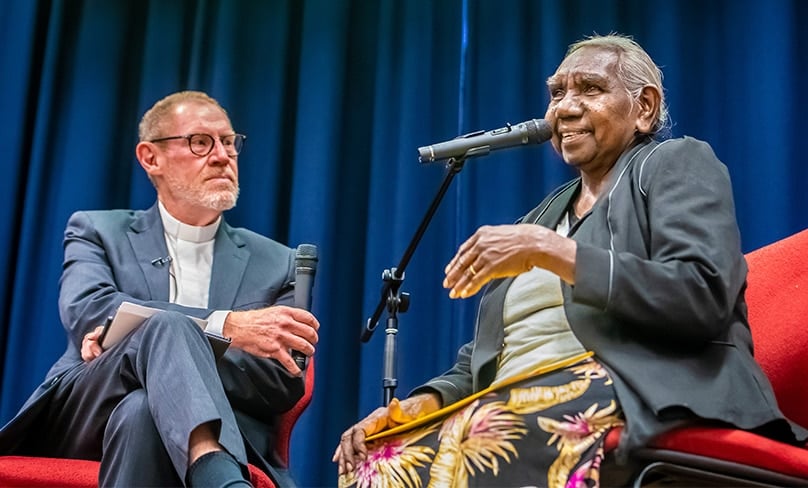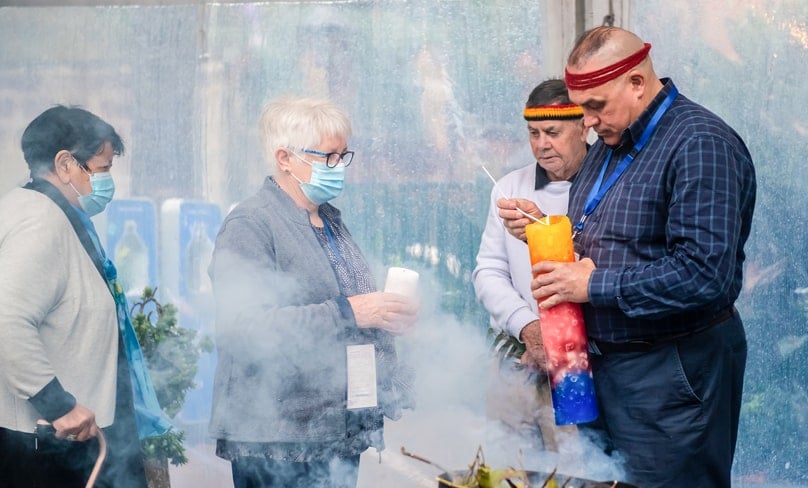
Working alongside Aboriginal and Torres Strait Islander peoples and other First Nations across the Asia Pacific region for the past 30 years has taught me two strong lessons: listen and pay respect to elders—and show reverence for the sacred present to all of us in the Spirit of Place.
Over that same period Australia has been subject to “the culture wars,” a political strategy that has weaponised race relations and often drowned out the voices of Indigenous, multicultural Australians and refugees. The result of these “wars” has been a failure to listen to those being argued about and active disrespect—if not denigration—of them, their lived experience, cultures and beliefs.
In the case of the Voice debate, Australian Catholics have clear guidance from both their own elders in the Plenary Council, the Australian Catholic bishops, the church’s Aboriginal Catholic ministry and its national peak body NATSICC (the National Aboriginal and Torres Strait Islander Catholic Council).
All the combined elders spoke out in a national listening exercise over many years, instigated by the previous Coalition Government and culminating in the 2017 Uluṟu Statement from the Heart, which has Voice, Truth and Treaty as its core recommendations and its invitation to all Australians.
It would be contrary to the spiritual tradition of a reconciling church, and the invitation from First People currently offered in the Uluṟu Statement, to refuse to listen to the elders and to disrespect them and the sacred nature of what is being offered in the Voice. What is needed is to permanently set right the relationship of all Australians who live on and with the spirit of this ancient sacred land and all its First Peoples.
No Aboriginal or Torres Strait Islander elder has tried to tell the Australian people and our Federal Government how to run the country. They have suggested a simple respectful process to give Voice to their perspectives about how the affairs of government impact on the lives of First Peoples.
If the Voice is established, government and its executive will make their own decisions according to normal representative decision-making processes. They will just be doing so with the benefit of having properly and respectfully listened to the elders, those chosen to represent our First People by First People.
Thankfully, as recent election results have clearly indicated, Australians have become sick of negativity and point scoring. This has literally become “white noise” in the background of a nation increasingly expressing its difference, diversity and a spirit of place in mutual respect and celebration of equal opportunity for all.
I believe, based on the results of the Plenary Council and recent federal elections, it is clear Australians are yearning for a proper partnership with First Nations people. It is an exciting thought that we may be on the threshold of learning how to live in right relationship with both the First People of Australia and with the country itself.
My hope now, as an elder in my own community of non-indigenous Australians, is that the Voice referendum will be a moment for all Australians to come together and show respect to our First Peoples’ elders—and to finally begin to complete the Truth Telling and Listening, that will help to bring us all together sharing in the Spirit of this ancient, wise and amazing place.

What the Australian Catholic Church has said
As Catholics hear the debate about this invitation to all Australians from our First People sisters and brothers, it is important to reflect on what the church elders have already decided on these issues.
At the Second Plenary Council of the Australian Catholic Church in July 2022 (a pretty sacred space for all Catholics in this country), three key motions addressing the church’s relationship with Aboriginal and Torres Strait Islander peoples were passed with an overwhelming majority. They concerned acknowledging past injustices and moving forward with a commitment to justice, truth and reconciliation. The Uluru Statement from the Heart was one of these and the Voice is included in that statement.
In November 2022 the Australian Catholic Bishops Conference also formally endorsed the Uluru Statement from the Heart, expressing the bishops’ gratitude for NATSICC’s reflections in helping to shape their thinking on this whole subject.
The Plenary Council’s agenda called for the Church to “honour and acknowledge the continuing deep spiritual relationship of Aboriginal and Torres Strait Islander peoples to this country, and commit ourselves to the ongoing journey of reconciliation.”
Among the key recommendations of the Uluru Statement is the establishment of a First Nations “Voice” to the Australian Parliament, and a commission to supervise a process of “truth-telling” between governments and Aboriginal and Torres Strait Islander peoples.
Listening to the stories of Aboriginal and Torres Strait Islander people, rather than talking about them, was the model the Bishops wanted to emulate with the National Aboriginal and Torres Strait Islander Catholic Council.
The Australian Catholic Church has clearly expressed its support for the Uluru Statement and the Voice as an inherent part of that invitation.
The position is clearly stated and it is one for Australian Catholics to reflect on and pray about and to remember that there will not be a better time to right the wrongs of the past.
Dr Robbie Lloyd works as a Social Justice Facilitator with the Justice and Peace Office of the Catholic Archdiocese of Sydney. He is also a community mental health and wellbeing professional who has worked in urban, regional and remote settings with Aboriginal and Torres Strait Islander communities for the past 30 years, including the remote communities of Wadeye, Nauiyu, the Tiwi Islands and Santa Teresa in the Northern Territory.
